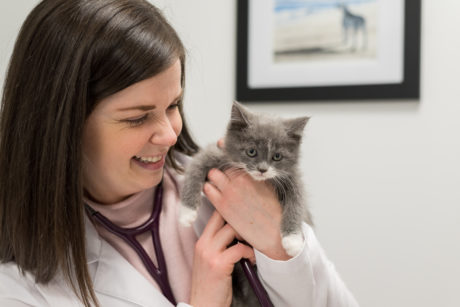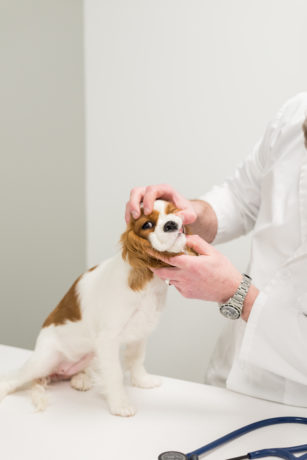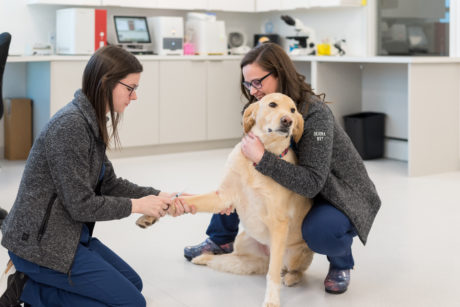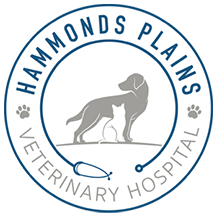
At Hammonds Plains Veterinary Hospital, we believe in the old saying, “An ounce of prevention is worth a pound of cure”.
This can mean different things for different people and their pets depending on factors such as their breed, age, and lifestyle.
We want to work with you to decide what kind of prevention and wellness strategy best suits your needs and that of your furry loved one. These strategies are best created collaboratively, therefore we always welcome your input and questions.
There are several main categories we can break prevention and wellness down into:
Checkups and Early Disease Detection
Annual checkups are a good idea for humans and animals alike. A lot goes on with the body in the run of a single year. An annual checkup is generally performed at the time of any annual vaccines coming due. At this time we assess all body systems that are able to be examined externally, as well as collecting a history from you (the owner) about how the past year has gone. We like to know if there have been any changes to appetite, energy levels, bathroom habits, any itching, ear odours, bad breath, etc. Maybe your pet has recently become slower on the stairs, or one ear seems to bother him after swimming, etc. We can learn a lot about a pet’s overall condition from a good history and physical exam.
Early disease detection is another aspect of wellness which is gaining traction with the availability of reliable diagnostic testing both in hospital and at external laboratories. This can be advantageous to all pets but becomes more important in older pets. Annual screening for common age-related changes to kidneys, liver, thyroid, and other internal organs can often be identified, tracked, and in many cases prevented, or delayed through supportive care, lifestyle changes, and supplementation before your pet is showing any signs of illness.
Contact Us TodayVaccination
Vaccination is critical to the health and wellbeing of most animals. It can prevent life-threatening diseases such as parvovirus, rabies, and distemper in dogs, as well as panleukopenia and leukemia virus in cats. We want to work with you to decide what kind of prevention and wellness strategy best suits your needs and that of your furry loved one. These strategies are best created collaboratively, therefore we always welcome your input and questions.
Some available vaccines include:

Dog
Da2pp (Distemper, Adenovirus, Parvovirus, Parainfluenza). A group of diseases that can cause a range of illnesses in puppies as well as older dogs that attach various body systems such as the liver and gastrointestinal system. These diseases are now seen much less often thanks to vaccination.
Rabies – An incurable disease of all mammals, 100% fatal, transmitted through bites. Nova Scotia has a very low incidence of Rabies virus in the wildlife population, vaccination of domestic animals helps to maintain this situation. Some facilities may require animals to have a rabies vaccine before entering, such as boarding and grooming facilities.
Leptospirosis- a bacterial disease carried by several wild animals in the area which is shed primarily in urine and enters the water. Many dogs will drink from puddles and other sources of standing water and thus can become exposed. Vaccination is one of the main methods of prevention of this disease, as well as avoidance of questionable water. Symptoms include fever, increased urination, vomiting, abdominal pain, cough, bloody stool, paralysis, and death. Diagnosis of this disease can be difficult in some cases. Urine from infected pets is also a risk to human health.
Lyme disease – A tick-borne illness carried by the Deer Tick in Nova Scotia, it is transmitted via the saliva during the feeding process. The disease can range from swollen, sore joints to a fatal acute kidney failure. Vaccination is one method of reducing the risks associated with this disease.
Bordetella (Kennel Cough) — a bacterial respiratory infection spread easily in environments where dogs are present in high concentrations such as parks, boarding facilities, daycares, and groomers. The disease classically causes a dry “honking” or non-productive cough. The vaccine is a good way to reduce the spread of infection and may be a requirement to enter some facilities.
Example Vaccination Guideline
Puppies:
- 6-8 Weeks – DA2PPv (Distemper / Parvovirus / Adenovirus / Parainfuenza)
- 10-12 Weeks – DA2PPv Booster + Optional Leptospirosis + Lyme + Bordetella (Kennel Cough)
- 14-16 Weeks – DA2PPv Booster 2 + Rabies + Boosters for optional Vaccinations

Cat
FVRCP (Rhinotracheitis, Panleukopenia, Calicivirus), a collection of diseases that cause systemic illness and respiratory illness in cats which can cause fever, depression, loss of appetite, vomiting, diarrhea, as well as respiratory difficulty. Some of these diseases have lifelong consequences. Most cats will come in contact with at least one of these diseases throughout their life. Vaccination is the best method of prevention.
Rabies — An incurable disease of all mammals, 100% fatal, transmitted through bites. Nova Scotia has a very low incidence of Rabies virus in the wildlife population, vaccination of domestic animals helps to maintain this situation. Some facilities may require animals to have a rabies vaccine before entering, such as boarding and grooming facilities.
Leukemia — a Viral, Immunosuppressive disease that can be spread between cats through fighting or mutual grooming. This virus leads to shortened lifespans (3 years on average) and health complications. Outdoor cats and cats in environments with large numbers of other cats present should receive this vaccine.
Example Vaccination Guideline
Kittens
- 6-8 Weeks – FVRCP (Feline Rhinotracheitis / Calicivirus / Panleukopenia)
- 10-12 Weeks – FVRCP Booster + Optional Feline Leukemia
- 14-16 Weeks – FVRCP Booster 2 + Optional Feline Leukemia Booster + Rabies
Adults:
- Most vaccinations aside from the 3 year DA2PPv, Rabies, and FVRCP will need to be boostered annually.
Parasite prevention
In Atlantic Canada, parasite prevention is primarily concerned with fleas, ticks, and intestinal worms. Additional concerns that are less common in the area are Heartworm and Lungworm. These parasites can be anything from a nuisance to vectors for serious disease.
Flea infestations can lead to hypersensitivity reactions (allergies) while ticks spread tick-borne infections such as Lyme disease and Anaplasmosis, Intestinal worms can contribute to chronic diarrhea and in some cases anemia. Heartworm can lead to congestive heart failure, and Lung Worm can cause Kennel Cough like symptoms.
Parasite prevention is most effective when approached through the use of tested and approved prescription products known to be effective through clinical trials and found to have a low incidence of side effects. Natural remedies, while in some cases can be effective, are generally not put through the same rigorous clinical trials as prescription products. We, therefore, do not know the rate of side effects on our pets. Just because something is safe for humans, does not mean it is safe for our pets. We advise caution when using “natural” or another over-the-counter flea/tick/parasite treatments.
 Nutritional Counselling
Nutritional Counselling
Hippocrates once said, “Let food be thy medicine, and medicine be thy food”. Today, we know how important nutrition can be in not only treating certain diseases but in prevention and overall wellness.
There is a seemingly endless amount of information out there regarding nutrition, some of which is fact and some of which is fiction. It seems every few months or years viewpoints change regarding what should be fed to your pets and what should not. Is corn good or bad? Should I feed grains or grain-free? Is raw food the best way to feed my pet? Should I feed kibble? Is kibble bad?
A discussion with your veterinarian can help you sort the facts from the fiction regarding food. We can also help in addressing specific needs for various conditions your pet may encounter throughout their life. Growing puppies require a diet different from that of healthy adults, while patients with food allergies may require assistance finding a diet that keeps them from itching or having diarrhea. An overweight pet may require a diet plan to assist with weight loss.
We can accomplish a lot through proper nutrition, whether it be homemade food or a prepared diet. Be sure to talk to your veterinarian about your pet’s nutrition and dietary needs.
Contact Us Today
 Nutritional Counselling
Nutritional Counselling